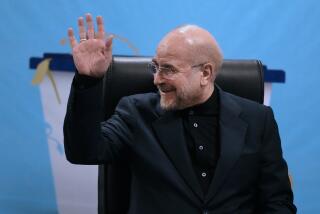Mullah, Imam, Cleric, President
In the run-up to today’s Iraqi interim national assembly elections, religion and politics freely mixed.
The United Iraqi Alliance, the slate expected to win the most votes, is a coalition of the country’s most prominent Shiite parties. Deciphering the terminology of Islamic leadership can be tricky. Familiar Western political titles, such as president, prime minister and cleric, function differently in countries where political Islam jostles with secularism. Amr Hamzawy of the Carnegie Endowment for International Peace and Anthony Tirado Chase of Occidental College led Opinion through the key terms and common misconceptions surrounding political Islam.
*
-- Compiled by Sarah Grausz
*
President
Definition: Ra’is in Arabic; one appointed or elected to preside over an organized body of people.
Confusion: Aren’t presidents in Muslim society equivalent to those in Western liberal democracies?
Reality: No. Presidents in the Middle East are generally authoritarian and not democratically elected. The 1997 Palestinian constitution adopted the term ra’is instead of “president,” which implied sovereign status. Literally, it means the same thing, so the Palestinians got to assert their sovereignty, while the Israelis got to deny it.
*
Prime Minister
Definition: Chief minister appointed by a ruler; often chief executive of a parliamentary democracy; found in a majority of Arab countries.
Confusion: So they’re like Tony Blair, right?
Reality: No. Middle Eastern prime ministers derive authority from the president or monarch and are generally a country’s No. 2 executive. The prime ministers of Jordan and Bahrain, for example, have technical but not political autonomy in policy-making and workings of government. The exception that proves the rule: Saudi Arabia, where Crown Prince and First Deputy Prime Minister Abdullah is heir to the throne -- and to the government.
*
Cleric
Definition: Literally, alim, or “learned one”; scholar of Islam.
Confusion: Aren’t all Islamic politicians clerics?
Reality: No. Usually, clerics are not politicians or political Islamists. The idea that a Muslim state should be ruled by those with the greatest understanding of Islam is rarely practiced outside Shiite Iran, where clerics became politically important with the Islamic revolution in the 1970s. A modern-day example of a cleric politician, Mohammad Khatami, is not only the Iranian president but also culture minister and head of Islamic guidance.
*
Mullah
Definition: “One who gives”; a religious teacher or leader; in Central Asian societies, a religious scholar; in Iran, a cleric at the bottom of the hierarchy.
Confusion: Wasn’t the leader of the Taliban a mullah?
Reality: No. Mullah Mohammed Omar, leader of the Taliban movement in Afghanistan, never finished his Islamic education. Omar called himself a talib (“one who seeks”) rather than a mullah. He also took the title “Commander of the Faithful,” which isn’t recognized by Muslims outside Afghanistan and hasn’t been adopted by any Muslim for nearly 1,000 years.
*
Warlord
Definition: A military commander exercising regional civil power.
Confusion: Aren’t warlords unique to Muslim societies?
Reality: No. The term “warlord” also applies to leaders in Latin America, Africa and Asia, where civil war creates opportunities for heavily armed combatants to rise to political or economic power. Warlords are generally driven by tribal or ethnic ties, not ideology. Lebanese warlord Walid Jumblatt and the late Ahmed Shah Masoud, the Afghan Northern Alliance leader assassinated in 2001, controlled swaths of their countries.
*
Sheik
Definition: Literally, old man or elder; often refers to head of a village or tribe; also spelled shaykh.
Confusion: Sheiks are religious figures, aren’t they?
Reality: Not usually. The term sheik has not been applied in a religious context since the Turkish Ottoman Empire nearly 100 years ago. In heavily patrimonial communities such as those in Iraq and Yemen, sheiks can carry enormous political weight. Religious figures, such as Sheik Ahmed Yassin, the Hamas spiritual leader killed by an Israeli missile attack in March, can carry the title. Quite often, sheik is a friendly nickname.
*
Imam
Definition: In Sunni Islam, any person who leads a religious community; in Shiite Islam, the title of Imam Ali, the prophet Mohammed’s cousin and son-in-law, and his heirs, who according to some scholars disappeared in the 9th century.
Confusion: Aren’t imams, like the pope, considered irreproachable and their word akin to God’s?
Reality: No. Although he is responsible for leading his community in both religious and political affairs, few followers consider an imam infallible. He is responsible for his mistakes to members of the community and, above all, to Allah. An imam’s primary public role is to conduct forums at Friday services, where he may address religious and political issues.
*
Ayatollah
Definition: High-ranking religious scholar in the Shiite Muslim world (doesn’t exist in Sunni societies).
Confusion: Aren’t ayatollahs deeply immersed in political decision-making?
Reality: Not necessarily. Ayatollah Ruhollah Khomeini, the late Iranian revolutionary leader, made sure that public policies complied with Islamic teachings. A more complicated situation exists in Iraq, where civil institutions and normally functioning government are missing. Grand Ayatollah Ali Sistani, who initially advised Shiite clerics against getting involved politically, later called for elections and a constitutional convention.
More to Read
Sign up for Essential California
The most important California stories and recommendations in your inbox every morning.
You may occasionally receive promotional content from the Los Angeles Times.









